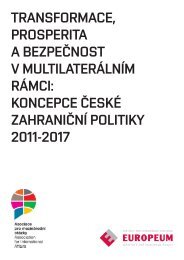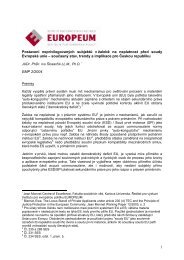eu constitutionalisation - EUROPEUM Institute for European Policy
eu constitutionalisation - EUROPEUM Institute for European Policy
eu constitutionalisation - EUROPEUM Institute for European Policy
Create successful ePaper yourself
Turn your PDF publications into a flip-book with our unique Google optimized e-Paper software.
Chapter 5: The <strong>European</strong> Constitution and the Re<strong>for</strong>m of External CompetencesIV.2. Rendering Implied Power Explicit?The CT’s Proposals on Implied CompetencesIV.2.1. IntroductionCompared to the complexity of the Court’s jurisprudence, the objective ofthe Working Group on ‘External Action’ with regard to implied externalcompetences was astonishingly simple: The treaty should indicate that theUnion is competent to conclude agreements dealing with issues fallingunder its internal competences and the new provision in the treaty shouldspecify that the Council should deliberate on such agreements according tothe same voting procedure which would apply to internal legislative deliberationson the same issues (normally QMV).²⁶ Two provisions in the CTnow seek to capture the ECJ’s case law on implied external competences.Firstly, Art. I-13 para 2 CT determines in which cases the Union shall haveexclusive competence <strong>for</strong> the conclusion of an international agreement:“The Union shall also have exclusive competence <strong>for</strong> the conclusionof an international agreement when its conclusion is provided <strong>for</strong>in a legislative act of the Union or is necessary to enable the Unionto exercise its internal competence, or insofar as its conclusion mayaffect common rules or alter their scope.”Second, another foundation is provided in Article III-323 CT, in the chapteron the conclusion of international agreements of Title V CT:“The Union may conclude an agreement with one or more thirdcountries or international organisations where the Constitution soprovides or where the conclusion of an agreement is necessary inorder to achieve, within the framework of the Union’s policies, oneof the objectives referred to in the Constitution, or is provided <strong>for</strong>in a legally binding Union act or is likely to affect common rulesor alter their scope.”Chapter 5: The <strong>European</strong> Constitution and the Re<strong>for</strong>m of External CompetencesBoth provisions to some extent seek to codify the Court’s findings in theAETR Case and Opinion 1/76²⁷ in the constitutional treaty. The two provisions,however, only partly overlap and, in essential points, translate theprinciples on implied competences in different ways. It is thereby not entirelyclear whether these deviances constitute an inadvertence in the draftingprocedure. Art. III-323 CT had, be<strong>for</strong>e its final approval in the IGC, beenamended by the Working Party of IGC Legal Experts on 11 June 2004, but thefundamental orientation of this provision remained untouched. Whilst Art.I-13 CT undoubtedly refers to exclusive external competences, Art. III-323CT remains silent as to the scope of Union competence that it confers. Art.III-323 CT confers wider powers, but its relation to Art. I-13 CT is left open.In any event, it is submitted that the CT’s proposals would confer extensiveexternal powers to the Union. Together with the Union’s competences in thecommon commercial policy that will be dealt with below, the member states’competences to act in the field of international trade might be significantlycurtailed. Against this background, it seems appropriate to look at the individualelements of Art. I-13 and Art. III-323 CT and the extent to which theseprovisions would broaden the scope of the Union’s external powers.IV.2.2. Implied Exclusive Powers in the CT...a. …when its conclusion is provided <strong>for</strong> in a legislative act of the UnionThe first element of Art. I-13 CT corresponds to the Court’s findings inOpinion 1/94 and 2/92²⁸, namely that the Union acquires an exclusiveexternal competence, where internal legislation includes provisions expresslyconferring on its institutions powers to negotiate with non-member countries.Such powers are limited to the spheres covered by those acts. Whatremains unclear, however, is under which conditions the <strong>European</strong> legislatormay decide to confer such powers upon the Union institutions in its legislativeacts. Up to now, this question has not been addressed in the Court’sjurisprudence. As Stefan Griller has pointed out, however, with a view tothe principle of conferral which ranks among the fundamental principles inthe constitution (Art. I-11 CT), it is hardly imaginable that the legislator maydecide ad libitum to procure external powers to the Union on the basis of any26) CONV 459/02, p.4.27) C-22/70, Commission of the <strong>European</strong> Communities vs Council of the <strong>European</strong> Communities, <strong>European</strong>Agreement on Road Transport, ECR 1971/263 and Opinion 1/76 of 26 April 1977, ECR 1977/741.28) Opinion 1/94 of 15 November 1994, ECR 1994/I-5267; Opinion 2/92 of 24 March 1995, ECR 1995/I-521.156157








